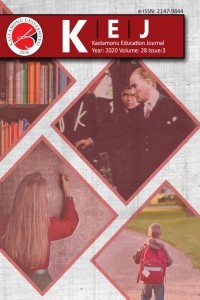Comparison of Instructors' Experiences in Distance Education and Face-to-Face Education Processes
Comparison of Instructors' Experiences in Distance Education and Face-to-Face Education Processes
Distance education Instructors, phenomenology,
___
- Aras, E., & Karakaya, Y. (2020). The views of academic staff working in sports education institutions towards distance education: a qualitative study. SPORMETRE Journal of Physical Education and Sport Sciences, 18(2), pp. 1-12.
- Atmojo, A., & Nugroho, A. (2020). EFL classes must go online! Teaching activities and challenges during Covid-19 pandemic in Indonesia. Register Journal, 13(1), pp. 49-76.
- Balıkçıoğlu, N., Öz, D., & Işın, N. (2019). University students' satisfaction research in distance education courses: The case of Aşık Veysel Vocational School. Cumhuriyet University Journal of Economics and Administrative Sciences, 20(1), pp. 462-473.
- Yayın Aralığı: Yılda 4 Sayı
- Başlangıç: 1995
- Yayıncı: Kastamonu Üniversitesi
Middle School Teachers' Views on Mathematical Creativity and Supporting Mathematical Creativity
Mine TURAN, Şeyma ŞENGİL AKAR, Elif YILDIRIM-SAYGI
The Effect of Peer Mentoring on Acceptance of and Intention to Use Web 2.0 Tools
Mehmet RAMAZANOĞLU, Tayfun AKIN, Mehmet Şahin SOLAK
The Relationship Between Readability and Text Design in Educational Websites
Fatma KESKİNKILIÇ, Serçin KARATAŞ
Sinem ŞENFERAH, Mahmut Sami KOYUNCU
Analysis of Sample Science Questions for Secondary School Exam in terms of Revised Bloom Taxonomy
Gülşah ZERMAN KEPCEOĞLU, Murat PEKTAŞ
Comparison of Instructors' Experiences in Distance Education and Face-to-Face Education Processes
